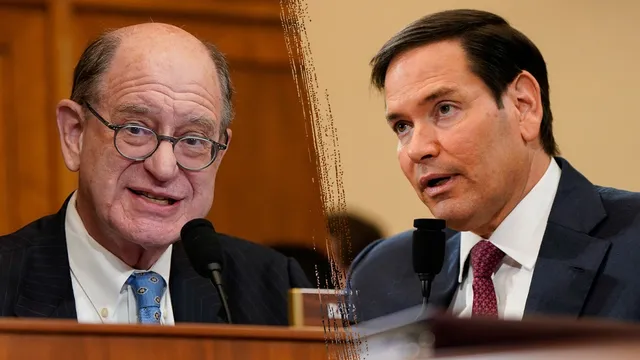
Marco Rubio defends Trump administration's controversial foreign policies during Senate hearing
2025-05-21 13:29- Marco Rubio faced scrutiny from Democratic senators regarding the Trump administration's foreign policies during a Senate Foreign Relations Committee hearing.
- Key issues discussed included the administration's handling of nuclear talks with Iran, refugee admissions, and the conflict in Gaza.
- Rubio's defense asserted that U.S. budget cuts would enhance international standing, despite disagreements with committee Democrats.
Express your sentiment!
Insights
In early 2025, during a Senate Foreign Relations Committee hearing in Washington D.C., Marco Rubio, who had recently been confirmed as Secretary of State, engaged in a heated exchange with Democratic senators regarding several key aspects of the Trump administration's foreign policy. The discussion addressed a spectrum of issues including the ongoing conflict between Russia and Ukraine, the Middle East dynamics, particularly the Israel-Hamas war, and the controversial decisions about refugee admissions, particularly concerning white Afrikaners from South Africa. While Rubio asserted that America’s foreign policy stance showcased renewed strength and achievements, Democratic senators challenged him on the grounds that these policies were eroding U.S. global influence. Rubio touted the administration's approach of striking agreements with Latin American countries to manage migrant deportations and underscored the importance of secure borders as a core principle of foreign policy. The hearing featured contentious dialogue, especially when Senators Tim Kaine and Chris Van Hollen pressed Rubio on the rationale behind suspending the general refugee admissions program while still permitting Afrikaners to enter the U.S. Rubio maintained that the administration had the right to dictate which refugees were admitted based on vetting capabilities, which in his view was a matter of practical governance rather than a racial consideration. Amidst the back and forth on immigration policies, Rubio defended the State Department's recent decisions regarding education visas, particularly aimed at preventing individuals who promote violence or unrest on campuses from entering the country. This stance sparked further conflict when Van Hollen expressed regret over voting for Rubio, which only intensified Rubio's resolve to emphasize the administration’s policies. Despite the tensions, Rubio asserted that he and the administration were positioned to bolster American interests abroad. He reiterated that the administration’s spending cuts, while controversial, would ultimately strengthen U.S. standing on the global stage. The event highlighted sharp divisions within U.S. foreign policy discourse, with Republicans largely supporting the Trump administration's direction while Democrats voiced their concerns regarding a perceived decline in global humanitarian leadership. As the hearing closed, it was evident that the questions surrounding the efficacy and ethics of the current administration’s foreign policies are unlikely to resolve anytime soon, continuing to spark debate in political circles moving forward.
Contexts
The Trump administration's foreign policy has been a highly contentious topic, drawing sharp criticism from various quarters, including political opponents, foreign governments, and even some members of the Republican Party. Critics argue that the administration's approach has been characterized by unpredictability and a departure from traditional diplomatic practices. Key issues that have generated significant frustration include the administration's handling of relations with allies and adversaries, withdrawal from international agreements, and a focus on unilateral action over multilateral diplomacy. The perception of an "America First" doctrine often led to strained relationships with long-standing allies and an erratic response to international crises, illustrating a significant shift in U.S. foreign policy stance. One of the most notable criticisms centers around the Trump administration's withdrawal from the Iran nuclear deal in 2018. Critics have argued that this move not only heightened tensions in the Middle East but also undermined U.S. credibility with allies who were part of the negotiations. The administration's policies towards North Korea have also faced scrutiny, with critics highlighting the risks associated with summit meetings that were seen as lacking substance. The unprecedented outreach to North Korean leader Kim Jong-un raised questions about whether genuine progress was being made on denuclearization or if it merely served to bolster the administration's image without yielding meaningful outcomes. Additionally, the Trump administration's handling of the COVID-19 pandemic has also come under fire in a foreign policy context, as many countries criticized the U.S. response and its implications for global health governance. The administration's tendency to retreat from international organizations, such as the World Health Organization, contributed to perceptions of American isolationism. Critics maintained that essential global cooperation in addressing pandemics and other transnational issues was undermined by a lack of engagement and leadership from the U.S. under the Trump administration. Moreover, the administration's stance on trade has led to conflicts with major trading partners and international economic institutions. The imposition of tariffs, particularly on China, drew criticism for inciting retaliatory measures and creating economic instability both domestically and internationally. This approach not only strained economic relations but also raised questions about the future of the global trading system, which relies heavily on cooperation and mutual benefit. Overall, the critiques of the Trump administration's foreign policy underscore a fundamental debate about the role of the United States in a rapidly evolving global landscape, highlighting tensions between isolationism and internationalism, along with the challenges posed by a changing world order.